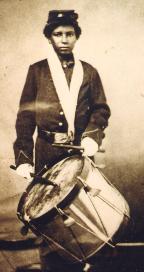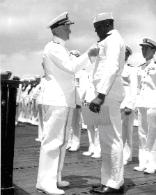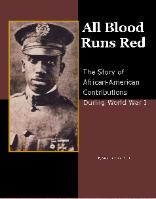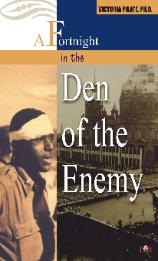Upcoming Children's Titles
Excerpts from New Fiction and Nonfiction for Children and Teens
All Blood Runs Red
One Harlem Hell Fighter had an unusual date with destiny that would lead to a Medal of
Honor nomination. On May 14, 1918, A World War I soldier of the all-black 369th Infantry
Regiment , Pvt. Henry Johnson, single-handedly fought off a German raiding party on a
forward listening post in France with a rifle and later with a boa knife after he ran out of
ammunition. Wounded 21 times, he rescued a wounded comrade.
He signed up with the 369th Infantry Regiment when it was formed from the National
Guard's 15th New York. Sent to France with the American Expeditionary Force in World
War I, the unit was lent to the French Army to help fill out depleted ranks. As a result, the
Guard soldiers entered combat within a month of their arrival in France.
One night in mid-May, Privates Johnson and Needham Roberts were on patrol in an
advance listening post along the front line when a 24-man German raiding party caught
the post by surprise with a violent grenade attack. Both Johnson and Roberts fought
back and were seriously wounded, but managed to fight off the first attack and crawl to
their grenade supply.
Throwing grenades one after the other like baseballs, they peppered the next attack with
explosive. Grabbing his rifle, he shot down a German and then clubbed the next one to
death with its buttstock. Turning, he spotted Roberts surrounded by three who were
choking him into submission.
Out of grenades and with his rifle jammed and broken, Johnson pulled out his knife and
killing one attacking German in a single stroke. Roberts broke free and continued
fighting. More shots, Johnson fell wounded and dazed, but grab a grenade off a dead
German and threw it at his attackers. At long last, Johnson and Roberts, after being
peppered with shrapnel and bullets, prevailed. When reinforcements arrived, the two
black soldiers were laughing and singing.
Johnson and Roberts were awarded the Croix de Guerre with palm leaf for Valor,
France's highest medal for bravery in combat and they were among the first such
awards given to Americans. Upon his return, Johnson and Roberts were hailed as
heroes in the New York City Victory Parade. Theodore Roosevelt referred to him as one
of the nation's five bravest Americans.
After the war, Johnson was unable to return to his old job because of his injuries. Post
traumatic stress and pain from war injuries caused him to turn to alcohol. He died in
1937 a premature death and undecorated by his own country. A Medal of Honor
application for him, submitted in 1996, was approved by then-Secretary of the Army
Caldera in 2001. But Joint Chiefs Chairman Harry Shelton did not concur. Since then
leaders of the state of New York have vowed to continue the push for the honor for
Johnson.
Honor nomination. On May 14, 1918, A World War I soldier of the all-black 369th Infantry
Regiment , Pvt. Henry Johnson, single-handedly fought off a German raiding party on a
forward listening post in France with a rifle and later with a boa knife after he ran out of
ammunition. Wounded 21 times, he rescued a wounded comrade.
He signed up with the 369th Infantry Regiment when it was formed from the National
Guard's 15th New York. Sent to France with the American Expeditionary Force in World
War I, the unit was lent to the French Army to help fill out depleted ranks. As a result, the
Guard soldiers entered combat within a month of their arrival in France.
One night in mid-May, Privates Johnson and Needham Roberts were on patrol in an
advance listening post along the front line when a 24-man German raiding party caught
the post by surprise with a violent grenade attack. Both Johnson and Roberts fought
back and were seriously wounded, but managed to fight off the first attack and crawl to
their grenade supply.
Throwing grenades one after the other like baseballs, they peppered the next attack with
explosive. Grabbing his rifle, he shot down a German and then clubbed the next one to
death with its buttstock. Turning, he spotted Roberts surrounded by three who were
choking him into submission.
Out of grenades and with his rifle jammed and broken, Johnson pulled out his knife and
killing one attacking German in a single stroke. Roberts broke free and continued
fighting. More shots, Johnson fell wounded and dazed, but grab a grenade off a dead
German and threw it at his attackers. At long last, Johnson and Roberts, after being
peppered with shrapnel and bullets, prevailed. When reinforcements arrived, the two
black soldiers were laughing and singing.
Johnson and Roberts were awarded the Croix de Guerre with palm leaf for Valor,
France's highest medal for bravery in combat and they were among the first such
awards given to Americans. Upon his return, Johnson and Roberts were hailed as
heroes in the New York City Victory Parade. Theodore Roosevelt referred to him as one
of the nation's five bravest Americans.
After the war, Johnson was unable to return to his old job because of his injuries. Post
traumatic stress and pain from war injuries caused him to turn to alcohol. He died in
1937 a premature death and undecorated by his own country. A Medal of Honor
application for him, submitted in 1996, was approved by then-Secretary of the Army
Caldera in 2001. But Joint Chiefs Chairman Harry Shelton did not concur. Since then
leaders of the state of New York have vowed to continue the push for the honor for
Johnson.
Not In Vain
Confederate troops as part of General Lee’s invasion of the North kidnapped black
civilians and led them off as slaves. Troops invading Pennsylvania in the summer of
1863 did more than steal supplies. Under orders from General Lee officers were to
submit formal requisitions to local officials for everything taken and to offer payment in
Confederate money. They stole nearly all available horses and destroyed wooden rail
fences for firewood.
They also captured any black person they could find. Though there were runaway slaves
in Pennsylvania, there were mostly freedmen and freeborn black people. Under direction
of Confederate Brigadier Albert Gallatin Jenkins, calvalry troops rounded up black
civilians. Some eyewitness accounts suggested up to 250 black Pennsylvanians were
captured by Confederate troops and sent South to enslavement. On the retreat South,
more blacks in Maryland were captured.
In Greencastle, locals fought back and saved 30 to 40 black women and children. The
Confederate chaplain in charge of the freed hostages demanded compensation and
threatened to burn the town if he were not paid thousands of dollars. Upon hearing of the
threat, some of the rescued black people began to walk back to Greencastle surrender
rather than allow the town to be burned. Some were able to escape.
The practice of enslaving any black person found in the North was not limited to one
instance or one group of Confederates. Shortly thereafter, Brigadier General John
Imboden’s McNeil’s Rangers terrorized Mercersburg capturing runaway slaves and free
people alike. They threatened to burn any house found harboring a runaway slave.
Though they seized people in the name of returning "property" to Confederate owners,
Confederate rangers refused to return some captured runaways to their purported
owners, claiming some women as booty for themselves and holding them as sex
slaves. Boys were also taken as war plunder.
civilians and led them off as slaves. Troops invading Pennsylvania in the summer of
1863 did more than steal supplies. Under orders from General Lee officers were to
submit formal requisitions to local officials for everything taken and to offer payment in
Confederate money. They stole nearly all available horses and destroyed wooden rail
fences for firewood.
They also captured any black person they could find. Though there were runaway slaves
in Pennsylvania, there were mostly freedmen and freeborn black people. Under direction
of Confederate Brigadier Albert Gallatin Jenkins, calvalry troops rounded up black
civilians. Some eyewitness accounts suggested up to 250 black Pennsylvanians were
captured by Confederate troops and sent South to enslavement. On the retreat South,
more blacks in Maryland were captured.
In Greencastle, locals fought back and saved 30 to 40 black women and children. The
Confederate chaplain in charge of the freed hostages demanded compensation and
threatened to burn the town if he were not paid thousands of dollars. Upon hearing of the
threat, some of the rescued black people began to walk back to Greencastle surrender
rather than allow the town to be burned. Some were able to escape.
The practice of enslaving any black person found in the North was not limited to one
instance or one group of Confederates. Shortly thereafter, Brigadier General John
Imboden’s McNeil’s Rangers terrorized Mercersburg capturing runaway slaves and free
people alike. They threatened to burn any house found harboring a runaway slave.
Though they seized people in the name of returning "property" to Confederate owners,
Confederate rangers refused to return some captured runaways to their purported
owners, claiming some women as booty for themselves and holding them as sex
slaves. Boys were also taken as war plunder.

Not In Vain
This nonfiction juvenile
title chronicles the
contributions of
African-Americans to the
United States during the
Civil War.
This nonfiction juvenile
title chronicles the
contributions of
African-Americans to the
United States during the
Civil War.
Heaven, Hell or Glory
This nonfiction juvenile
title details the
contributions of civilians
and military services
members of color during
World War II.
This nonfiction juvenile
title details the
contributions of civilians
and military services
members of color during
World War II.
What Kind of Name is
That?
This historical fiction title
details parallels a
multiethnic child in today
to his ancestor of the
Civil War era. After being
teased about his name,
the child learns to value
his name and his unique
heritage.
That?
This historical fiction title
details parallels a
multiethnic child in today
to his ancestor of the
Civil War era. After being
teased about his name,
the child learns to value
his name and his unique
heritage.

What Kind of Name is That?
Wing-kai raced to his mother, working on the yard. He stumbled the last few steps and
nearly fell beside her as she worked. His mother, having been deep in thought about
whether the tulips were the right color, had not heard him approach and jarred.
"Hi Sweetie," his mother smiled then frowned quickly when she saw the tears in his
eyes. "What's wrong? What's happened?" she asked.
"Mommy, am I a yellow nig? Is my grandfather Satan?" he wailed as she reached for him.
"What?" his mother exclaimed in dismay. His mother felt her stomach curdle. The words
stung her ears. She had known the day would come when she would have to explain
racism but she never thought it would be at age six.
"They said at school I was half a black person so they could only call me a nig. What
does that mean? Brad said with a name like Pilate I had to be a product of Satan."
"I.. I can't believe this. What kind of language is that?" she held Wing-kai tightly for a
moment then looked at him squarely. "No, you are not a nig, a yellow nig or any other
kind of nig. And no your grandfather is not Satan. Who said such a thing to you?"
"Brad started then some other kids. They said I was a brown banana and Tiger Woods
ugly cousin and Satan's grandchild."
"This is outrageous." His mother stood up and drew him near. "You are my precious
angel, my gift from God. You are none of those horrible names."
His mother felt her throat tighten and her face become flushed. Her words were firm but
she knew she was close to tears. "You have a name with much history behind it. Not
just from your daddy’s brother Wing-kai. He died so tragically but he was a good man.”
His mother smiled at him weakly.
“Let's go inside. We will have an end to this foolishness." She kissed him then balanced
herself to stand. She held him close, resting her hand gently on his head as they walked
to the door. She whispered to him as she had often done as he drifted off to sleep.
“I will tell you all about your name. About your very brave great-great-great grandparents.
I never told you about Pontius Pilate." Wing-kai looked up at his mother with a troubled
look. "No, not that Pontius Pilate," she smiled at his puzzled expression and squeezed
his shoulders. "Your ancestor gave his son that name for a special reason. Our Pontius
Pilate was a very brave soldier in the Civil War. He's half the reason you have the last
name you have. When Daddy gets home, he'll tell you about your ancestor Li Xin Chang
and how he came to America from China.”
Wing-kai raced to his mother, working on the yard. He stumbled the last few steps and
nearly fell beside her as she worked. His mother, having been deep in thought about
whether the tulips were the right color, had not heard him approach and jarred.
"Hi Sweetie," his mother smiled then frowned quickly when she saw the tears in his
eyes. "What's wrong? What's happened?" she asked.
"Mommy, am I a yellow nig? Is my grandfather Satan?" he wailed as she reached for him.
"What?" his mother exclaimed in dismay. His mother felt her stomach curdle. The words
stung her ears. She had known the day would come when she would have to explain
racism but she never thought it would be at age six.
"They said at school I was half a black person so they could only call me a nig. What
does that mean? Brad said with a name like Pilate I had to be a product of Satan."
"I.. I can't believe this. What kind of language is that?" she held Wing-kai tightly for a
moment then looked at him squarely. "No, you are not a nig, a yellow nig or any other
kind of nig. And no your grandfather is not Satan. Who said such a thing to you?"
"Brad started then some other kids. They said I was a brown banana and Tiger Woods
ugly cousin and Satan's grandchild."
"This is outrageous." His mother stood up and drew him near. "You are my precious
angel, my gift from God. You are none of those horrible names."
His mother felt her throat tighten and her face become flushed. Her words were firm but
she knew she was close to tears. "You have a name with much history behind it. Not
just from your daddy’s brother Wing-kai. He died so tragically but he was a good man.”
His mother smiled at him weakly.
“Let's go inside. We will have an end to this foolishness." She kissed him then balanced
herself to stand. She held him close, resting her hand gently on his head as they walked
to the door. She whispered to him as she had often done as he drifted off to sleep.
“I will tell you all about your name. About your very brave great-great-great grandparents.
I never told you about Pontius Pilate." Wing-kai looked up at his mother with a troubled
look. "No, not that Pontius Pilate," she smiled at his puzzled expression and squeezed
his shoulders. "Your ancestor gave his son that name for a special reason. Our Pontius
Pilate was a very brave soldier in the Civil War. He's half the reason you have the last
name you have. When Daddy gets home, he'll tell you about your ancestor Li Xin Chang
and how he came to America from China.”
A Fortnight in the Den of the Enemy
"Only a few seconds left, " he thought. "I've got to get out here. She's gonna crash."
O'Neil fought to get the hatch open. The twisted metal groaned as he pushed with all his
might. Finally it budged open and he jumped without a moment's thought.
Silently he counted seconds as he searched the skies for German planes. The one who
had shot him was in pursuit of the escort bombers. "He'll never catch them." The thought
gave him some satisfaction as he watched his own plane plunge downward. He had
never lost an escort. Neither had any of the other Redtail flyers.
He pulled the shoot as he turned and surveyed the ground for a landing place. "Farm
land, maybe some buildings over there," he thought as he strained to see land though
the darkness. "The Krauts must have seen my parachute. I won't have long." The land
below came in clearer as he descended. "Oh no, I'm headed for trees. Can't miss them
with this wind. I need a clearing."
The trees rushed to meet him. O'Neil yelped as his right knee crushed into one branch.
He hit the ground with a heavy thud. "Got to move. The Krauts will have troops here
soon." He grimaced as he tried to stand. "I won't make it far on his knee," he thought as
he surveyed the damage to his leg. Remembering his parachute would be a beacon to
planes above, he stopped and quickly began gathering his parachute. The canvas
would be easy to spot from land or air.
"Now what?" he dryly thought as he surveyed his surroundings. There was just enough
light to see a few hundred yards away.
O'Neil knew he was in trouble. The Germans had seen his parachute. There would be a
welcome party soon. This was occupied France and he didn't know where the nearest
Resistance cell was. Local collaborators were known to turn in Allied troops for money.
He was alone. He was hurt. No food to speak of and little gunpower.
"I won't go quietly," he vowed as he pulled his revolver out.
"Only a few seconds left, " he thought. "I've got to get out here. She's gonna crash."
O'Neil fought to get the hatch open. The twisted metal groaned as he pushed with all his
might. Finally it budged open and he jumped without a moment's thought.
Silently he counted seconds as he searched the skies for German planes. The one who
had shot him was in pursuit of the escort bombers. "He'll never catch them." The thought
gave him some satisfaction as he watched his own plane plunge downward. He had
never lost an escort. Neither had any of the other Redtail flyers.
He pulled the shoot as he turned and surveyed the ground for a landing place. "Farm
land, maybe some buildings over there," he thought as he strained to see land though
the darkness. "The Krauts must have seen my parachute. I won't have long." The land
below came in clearer as he descended. "Oh no, I'm headed for trees. Can't miss them
with this wind. I need a clearing."
The trees rushed to meet him. O'Neil yelped as his right knee crushed into one branch.
He hit the ground with a heavy thud. "Got to move. The Krauts will have troops here
soon." He grimaced as he tried to stand. "I won't make it far on his knee," he thought as
he surveyed the damage to his leg. Remembering his parachute would be a beacon to
planes above, he stopped and quickly began gathering his parachute. The canvas
would be easy to spot from land or air.
"Now what?" he dryly thought as he surveyed his surroundings. There was just enough
light to see a few hundred yards away.
O'Neil knew he was in trouble. The Germans had seen his parachute. There would be a
welcome party soon. This was occupied France and he didn't know where the nearest
Resistance cell was. Local collaborators were known to turn in Allied troops for money.
He was alone. He was hurt. No food to speak of and little gunpower.
"I won't go quietly," he vowed as he pulled his revolver out.
A Fortnight in the Den of
the Enemy
Based on actual events of
Tuskegee Airmen, this
historical fiction title tells
the story of a black airman
shot down over occupied
France during World War II
and his journey back from
the den of the enemy.
the Enemy
Based on actual events of
Tuskegee Airmen, this
historical fiction title tells
the story of a black airman
shot down over occupied
France during World War II
and his journey back from
the den of the enemy.
Heaven, Hell or Glory
All Blood Runs Red
This nonfiction juvenile
title chronicles the
contributions of
African-Americans in the
military during World War I.
This nonfiction juvenile
title chronicles the
contributions of
African-Americans in the
military during World War I.
The extraordinary events in Sommocolonia, Italy on December 26, 1944 would
ultimately, more than 50 years later, lead to a Medal of Honor for First Lieutenant John
Fox. In 1944, Fox served as a member of Cannon Company, 366th Infantry Regiment,
92nd Infantry Division. On Christmas night, enemy soldiers gradually infiltrated
Sommocolonia in civilian clothes, by dawn the town was largely in German hands. An
organized attack by uniformed German units began just before dawn at 4 am . A heavy
barrage of artillery shattered the peace of the morning. Outnumbered, U.S. infantry
forces had to withdraw but Fox and others voluntarily remained on the second floor of a
house to direct U.S. artillery fire.
Four hours later, Fox reported by radio he could see German troups in the streets and
attacking in strength. He called for defensive artillery fire to slow their advance.
However, the troops continued to advance towards Fox’s position. He called for artillery
shells closer to his position.
Finally he gave direction to adjust fire on top of his position. After acknowledging it
would mean his death, Fox insisted the adjustment be made as the only way to defeat
the advancing Germans who were overrunning his position. His order was followed.
When the allies retook the town, Lieutenant Fox’s box was found in the rubble along with
the bodies of a hundred odd German soldiers.
ultimately, more than 50 years later, lead to a Medal of Honor for First Lieutenant John
Fox. In 1944, Fox served as a member of Cannon Company, 366th Infantry Regiment,
92nd Infantry Division. On Christmas night, enemy soldiers gradually infiltrated
Sommocolonia in civilian clothes, by dawn the town was largely in German hands. An
organized attack by uniformed German units began just before dawn at 4 am . A heavy
barrage of artillery shattered the peace of the morning. Outnumbered, U.S. infantry
forces had to withdraw but Fox and others voluntarily remained on the second floor of a
house to direct U.S. artillery fire.
Four hours later, Fox reported by radio he could see German troups in the streets and
attacking in strength. He called for defensive artillery fire to slow their advance.
However, the troops continued to advance towards Fox’s position. He called for artillery
shells closer to his position.
Finally he gave direction to adjust fire on top of his position. After acknowledging it
would mean his death, Fox insisted the adjustment be made as the only way to defeat
the advancing Germans who were overrunning his position. His order was followed.
When the allies retook the town, Lieutenant Fox’s box was found in the rubble along with
the bodies of a hundred odd German soldiers.


